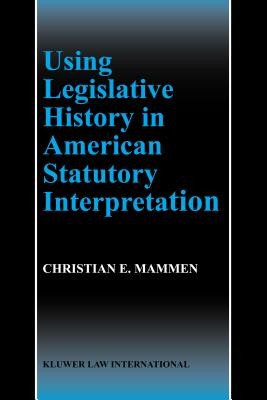
- We will send in 10–14 business days.
- Author: Christian E Mammen
- Publisher: Kluwer Law International
- Year: 2002
- ISBN-10: 9041188797
- ISBN-13: 9789041188793
- Format: 16.6 x 25.8 x 2 cm, hardcover
- Language: English
- SAVE -10% with code: EXTRA
Using Legislative History in American Statutory Interpretation (e-book) (used book) | bookbook.eu
Reviews
Description
Using Legislative History in American Statutory Interpretation examines the United States Supreme Court's actual use of legislative history in statutory interpretation, distills the theoretical issues presented by the Court's practices, then analyzes those issues in light of the arguments of several leading theorists. The book separates the utility and usability of legislative history from theories based on legislative intention. Rather than basing an argument for using legislative history on legislative intention, it argues that legislative history conveys a certain degree of expertise and/or provides certain contextual information about the subject matter of the statute. Legislative history may also be authoritative as a matter of judicial precedent; that is, legislative history may be authoritative because judges have said so in published opinions. The book then follows Joseph Raz and argues that the only legislative intentions that may be identified and deemed legally authoritative as a matter of general theory are minimal intentions relating to the enactment of a particular text as a legally authoritative statute within a particular legal system. This approach--justifying the Court's discretionary use of legislative history without reference to legislative intention--accounts for and undermines most of the major objections to using legislative history, such as objections based on the theoretical problems surrounding legislative intentions, objections based on the perceived unconstitutionality of relying on legislative history, and objections based on its frequent inutility.EXTRA 10 % discount with code: EXTRA
The promotion ends in 16d.16:41:38
The discount code is valid when purchasing from 10 €. Discounts do not stack.
- Author: Christian E Mammen
- Publisher: Kluwer Law International
- Year: 2002
- ISBN-10: 9041188797
- ISBN-13: 9789041188793
- Format: 16.6 x 25.8 x 2 cm, hardcover
- Language: English English


Reviews